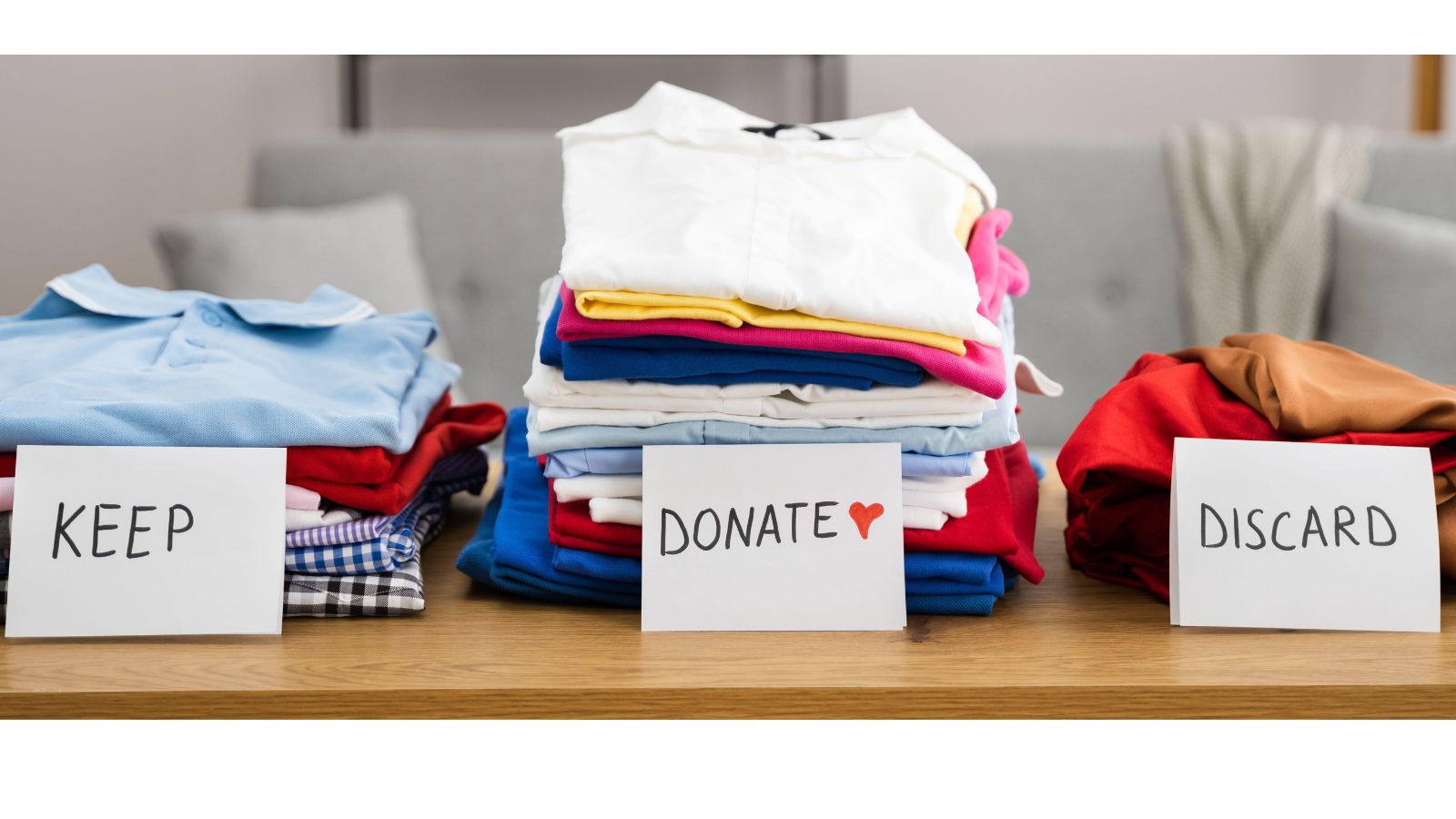
Design expertise in your inbox – from inspiring decorating ideas and beautiful celebrity homes to practical gardening advice and shopping round-ups.
You are now subscribed
Your newsletter sign-up was successful
Want to add more newsletters?

Twice a week
Homes&Gardens
The ultimate interior design resource from the world's leading experts - discover inspiring decorating ideas, color scheming know-how, garden inspiration and shopping expertise.

Once a week
In The Loop from Next In Design
Members of the Next in Design Circle will receive In the Loop, our weekly email filled with trade news, names to know and spotlight moments. Together we’re building a brighter design future.

Twice a week
Cucina
Whether you’re passionate about hosting exquisite dinners, experimenting with culinary trends, or perfecting your kitchen's design with timeless elegance and innovative functionality, this newsletter is here to inspire
There’s nothing as liberating as getting rid of items you no longer need, but the fear of letting something go – then wishing you hadn’t – is enough to make anyone double-guess their decluttering decisions, or even put it off altogether.
The key to overcoming it is to find ways to avoid declutter regret in the first place.
While we’re all for an enthusiastic approach to decluttering, you’re far more likely to panic purge past the point of no return if you’re feeling rushed. Taking the time to make rational, well-informed decisions is one of the best things you can do to ensure you feel confident in them now, and further down the line, too.

After nearly 10 years working in the magazine industry, seasoned writer Tara decided to specialize in the topics she’s most passionate about: organizing, cleaning, interior design, wellbeing, craft and homemaking. Tara has written many decluttering and organization features for Homes & Gardens, speaking to and interviewing some of the world's top organization professionals along the way.
10 ways to avoid ‘declutter regret’
Declutter regret is a very real fear, one that shouldn’t be undermined. ‘I might need this one day’ is, after all, a valid point. Yes, you might. But as any decluttering expert will tell you, predicting what you might need years from now, and preparing for it in advance, is virtually impossible.
‘There’s always a small risk of regret when you declutter, but ultimately, you can only work on the basis of what you need in your life right now. The more decluttering you do, the more confident you start to feel about making decisions and the less likely you are to feel any regret in the future’, says professional organizer Laura Price of The Home Organisation.
The takeaway? Don’t let those decluttering fears hold you back. With help from the experts, we’ve put together a list of 10 ways to avoid declutter regret, including effective decluttering tips as well as top decluttering mistakes to avoid, so you can start living the clutter-free life you’ve been yearning for.
1. Take your time
Declutter regret is a real thing, most often experienced when decluttering in haste. The key to avoiding it is to take your time. Set yourself clear, realistic goals – organizing your closet, for example, or decluttering toys. Go through each item and really consider what you want to do with it.
Design expertise in your inbox – from inspiring decorating ideas and beautiful celebrity homes to practical gardening advice and shopping round-ups.
‘Creating a criterion for choosing what to keep in advance of decluttering can really help you with the decision-making process’, says professional organizer Sharon McNulty, founder of Joyful Spaces. ‘Questions to ask yourself include:
- Do you love it, or does it evoke beautiful memories?
- Would you buy it again at full price?
- If it got damaged, would you spend the time, energy and money getting it repaired?
- Do you see yourself using or wearing it in five years' time?
'If you answer yes to any of the above, then you can keep the item with confidence.
'If you answer no, then let it go with gratitude.’
2. Start with the area that bothers you most
Attempting to declutter an entire house, or even a room, can be very overwhelming. A clear mind is essential for decision-making, so if you're wondering how to declutter your home when you feel overwhelmed, the answer is to not try to tackle everything at once. Start with the area that causes you the most stress – an overflowing dresser, or a pile of paperwork, for example. The sense of relief at getting rid is likely to overcome any declutter regret you may feel, and will spur you on to declutter elsewhere, too.
3. Allow yourself a ‘maybe’ box
To take some of the pressure off, any items that you’re really unsure of can be placed into a ‘maybe’ box. Store this box somewhere out of sight for a month or so. If you don’t miss any of the items in that time, you can feel confident in passing them on permanently.
4. Don’t declutter on behalf of someone else – especially children
Decluttering for others in general is a big no-no, but children in particular can find it very upsetting if you make decisions without consulting them. It’s bad enough experiencing declutter regret for yourself, let alone your little ones, so be sure to involve and support them throughout the decision-making process.
‘Let them know that those items aren’t going into the garbage bin – that’s a recipe for a meltdown – instead, they’re being donated to others who will love and play with them’, says professional organizer Brenda Scott of Tidy My Space.
5. Keep hold of important documents
While most paper clutter can be fed to the shredder, there are some documents you will need to keep hard copies of throughout your lifetime – think birth certificates, house deeds, tax records, social security cards and so on. Once gotten rid of, they can be extremely hard to replace, so save yourself the headache and keep hold of them.
‘There are certain papers you’ll need to keep safe in order to validate insurance claims, too; receipts for household items, for example. You will also need to keep warranties and guarantees for the duration of their term’, adds Kate Ibbotson, APDO member and founder of A Tidy Mind.
6. Don’t be TOO ruthless
Occasional household appliances, gadgets and tools fall victim to decluttering all the time, and mostly for good reason. However, it’s worth giving some real thought to whether you’ll need an item before getting rid. If it’s likely to serve a (valid) purpose, no matter how occasional it might be, it’s okay to hold onto it – you’ll only regret it further down the line otherwise!
To avoid clutter building up, find somewhere to keep occasional items outside of prime storage space. Consider doing ‘seasonal swaps’; snow blowers, ice scrapers, holiday decor etc, can be exchanged for paddling pools, electric fans and any other seasonal occasional item.
7. Let go of obligations
If you’ve fallen into the trap of hanging on to heirlooms – your great aunt’s paintings, or her beloved tea set – just because they’re so old, rather than because they really mean something to you, it’s time to free yourself of the obligation. If you actually like them and want them in your home, that’s fine, but giving inherited items away does not make you a bad person.
‘Keep in mind that your home is not a museum and memories are not in physical objects, so you should be able to remove them from your home without feeling guilty’, say the decluttering experts at The Classy Home.
If you’re struggling with guilt, consider offering the items to another family member, or pass it on to a new home where you know it’ll be appreciated.
8. Create a memory book
Sentimental attachment is one of the main reasons for holding onto things, so to help you distinguish what really matters, ask yourself this; what would you grab if there was a fire? Limit yourself to one small ‘memory box’, and create an edited collection of those items that mean the most – the rest can be photographed and cataloged in a ‘memory book’.
Remember that your memories, and the people you made them with, are worth so much more than the item itself. If you feel like you’re missing the ‘thing’, reach out to a loved one instead, and talk about the memory you share’, says professional organizer Julie Onstot, of SortWell Organizing Co.
9. Turn clutter into cash
Another common reason for holding onto items is because they cost a lot to purchase in the first place. We feel we are wasting money spent on an item if we get rid of it, but it has no value hidden away. That expensive coat that’s been hanging in the closet for over a year? It’s time to let it go. If the monetary value is causing you bother, consider selling the item. A yard sale is particularly rewarding as you can see your items going to good homes. For more valuable items, be sure to seek advice from a specialist seller.
‘Treat yourself with the money made from selling items; rather than a material item, choose an experience that’ll bring you joy and happy memories – a spa treatment, or visiting your favorite restaurant, for example’, says cleaning and organizing expert Laura Mountford, @lauracleanaholic.
10. Pass items on to a good cause
When decluttering, pick a charity or cause that resonates for you personally and you’ll find it a lot easier to make your peace with letting go, advises professional organizer Katherine Blackler of SortMySpace Ltd. Alternatively, chat with neighbors and friends to see if they’re in need of anything you’re looking to get rid of – you’re less likely to feel regret knowing your items are going to a good home’.
What should you not do when decluttering?
Falling victim to decluttering mistakes can make organizing your home feel far more stressful than it needs to, not to mention make declutter regret much more likely. The main one to avoid is not allowing yourself enough time. People are often shocked by how lengthy the decluttering process can be – if you’re doing the job properly that is. Rather than rush through, set yourself manageable goals; organizing drawers in a day, or 30 minutes a day for a week, are good examples, but it’s whatever works for you and your schedule.
Time pressure specifically, but avoiding pressure in general when decluttering is a good idea if you want to remain confident in your decision-making. Decluttering can be an overwhelming process, so be kind to yourself. Allow yourself some leeway with things – you don’t have to declutter everything, but set some boundaries to ensure you make headway; one box of sentimental items only, for example. To avoid feelings of regret, be sure to donate sentimental items to places you’re familiar with, such as friends, family or a charity that resonates.
What is the 20/20 rule for decluttering?
If you’re struggling to make decisions, the 20/20 rule for decluttering can help you distinguish what’s really worth keeping. ‘If you're on the fence about something, think about what it would take to replace that item if you needed to. If it would take you less than 20 minutes, and cost you less than £20, go ahead and get rid of it. The effort of replacing it is not worth the space it’s taking up in your home, and chances are, you won’t miss it anyway’, says Laura Price.

For 10 years, Tara King worked as a Content Editor in the magazine industry, before leaving to become freelance, covering interior design, wellbeing, craft and homemaking. As well as writing for Ideal Home, Style at Home, Country Homes & Interiors, Tara’s keen eye for styling combined with a passion for creating a happy – and functional – family home has led to a series of organization and cleaning features for H&G.
